Evaluating Leadership and Management in Tesco's Operational Context
VerifiedAdded on 2023/01/06
|19
|4941
|78
Report
AI Summary
This report provides a comprehensive analysis of leadership and management practices within Tesco, a major British multinational retailer. It begins by defining and differentiating the roles and characteristics of leaders and managers, contrasting their responsibilities and approaches within the organization. The report then examines how these roles are applied in various situations, such as new product launches and crisis management, illustrating the practical application of leadership and managerial functions. Furthermore, it explores the application of different leadership theories and models, including situational, system, and contingency approaches, evaluating their strengths and weaknesses within the context of Tesco's operations. The report also delves into key approaches to operations management, highlighting the roles of leaders and managers in this area. Finally, it evaluates the factors within the business environment that influence operational management and decision-making processes, offering a holistic view of leadership and management in a dynamic retail setting. This report aims to provide insights into effective leadership and management strategies in a complex business environment.
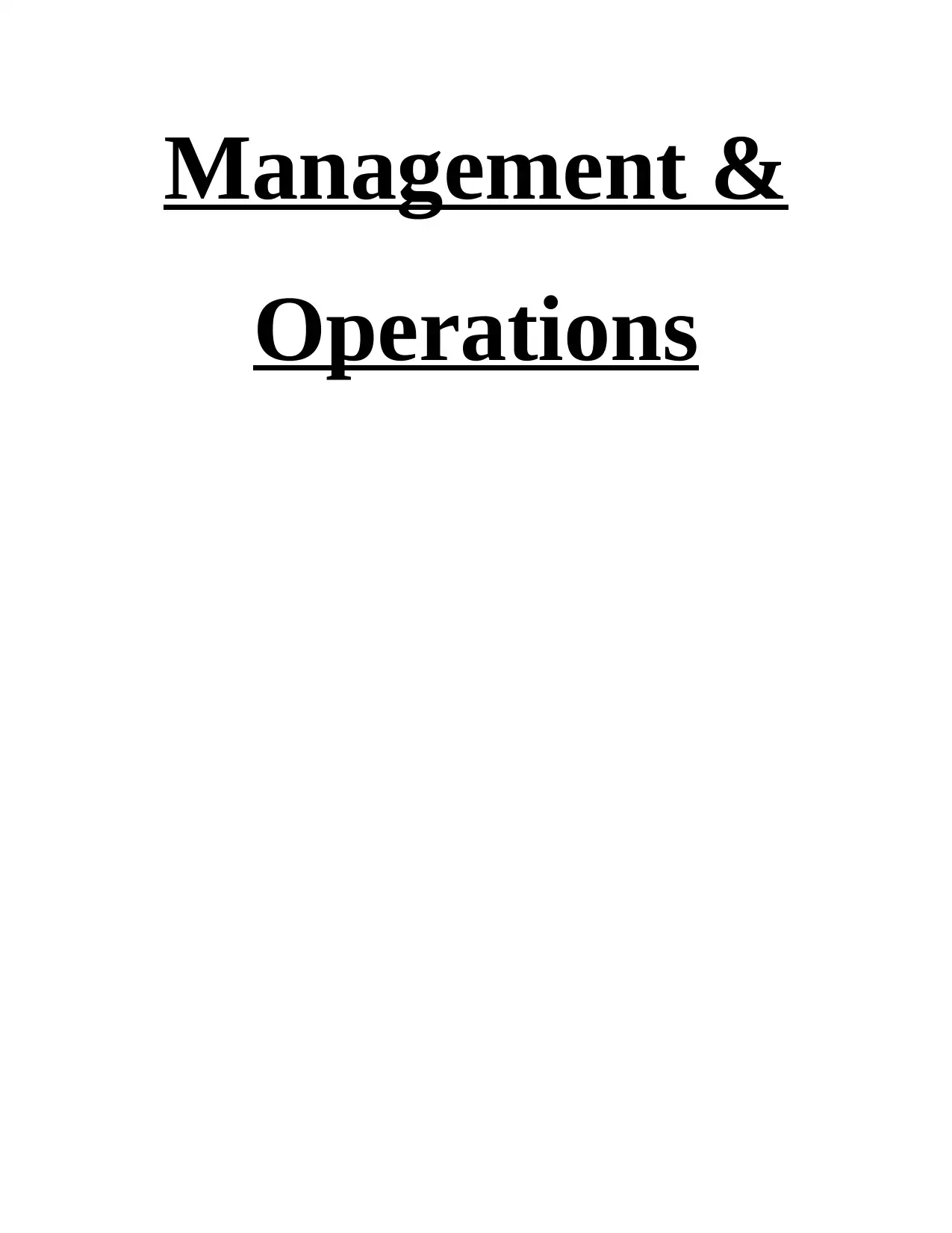
Management &
Operations
Operations
Paraphrase This Document
Need a fresh take? Get an instant paraphrase of this document with our AI Paraphraser
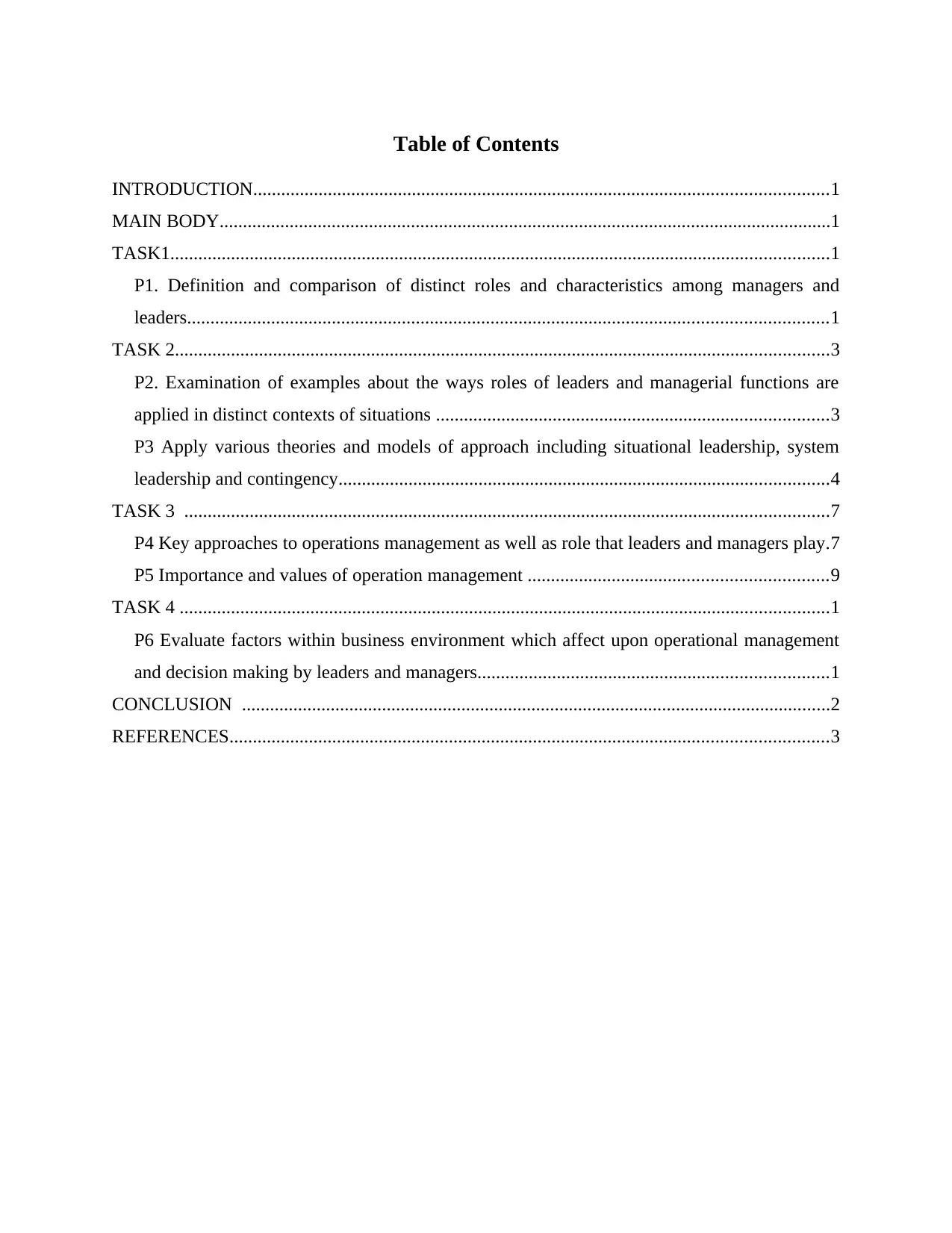
Table of Contents
INTRODUCTION...........................................................................................................................1
MAIN BODY...................................................................................................................................1
TASK1.............................................................................................................................................1
P1. Definition and comparison of distinct roles and characteristics among managers and
leaders.........................................................................................................................................1
TASK 2............................................................................................................................................3
P2. Examination of examples about the ways roles of leaders and managerial functions are
applied in distinct contexts of situations ....................................................................................3
P3 Apply various theories and models of approach including situational leadership, system
leadership and contingency.........................................................................................................4
TASK 3 ..........................................................................................................................................7
P4 Key approaches to operations management as well as role that leaders and managers play.7
P5 Importance and values of operation management ................................................................9
TASK 4 ...........................................................................................................................................1
P6 Evaluate factors within business environment which affect upon operational management
and decision making by leaders and managers...........................................................................1
CONCLUSION ..............................................................................................................................2
REFERENCES................................................................................................................................3
INTRODUCTION...........................................................................................................................1
MAIN BODY...................................................................................................................................1
TASK1.............................................................................................................................................1
P1. Definition and comparison of distinct roles and characteristics among managers and
leaders.........................................................................................................................................1
TASK 2............................................................................................................................................3
P2. Examination of examples about the ways roles of leaders and managerial functions are
applied in distinct contexts of situations ....................................................................................3
P3 Apply various theories and models of approach including situational leadership, system
leadership and contingency.........................................................................................................4
TASK 3 ..........................................................................................................................................7
P4 Key approaches to operations management as well as role that leaders and managers play.7
P5 Importance and values of operation management ................................................................9
TASK 4 ...........................................................................................................................................1
P6 Evaluate factors within business environment which affect upon operational management
and decision making by leaders and managers...........................................................................1
CONCLUSION ..............................................................................................................................2
REFERENCES................................................................................................................................3
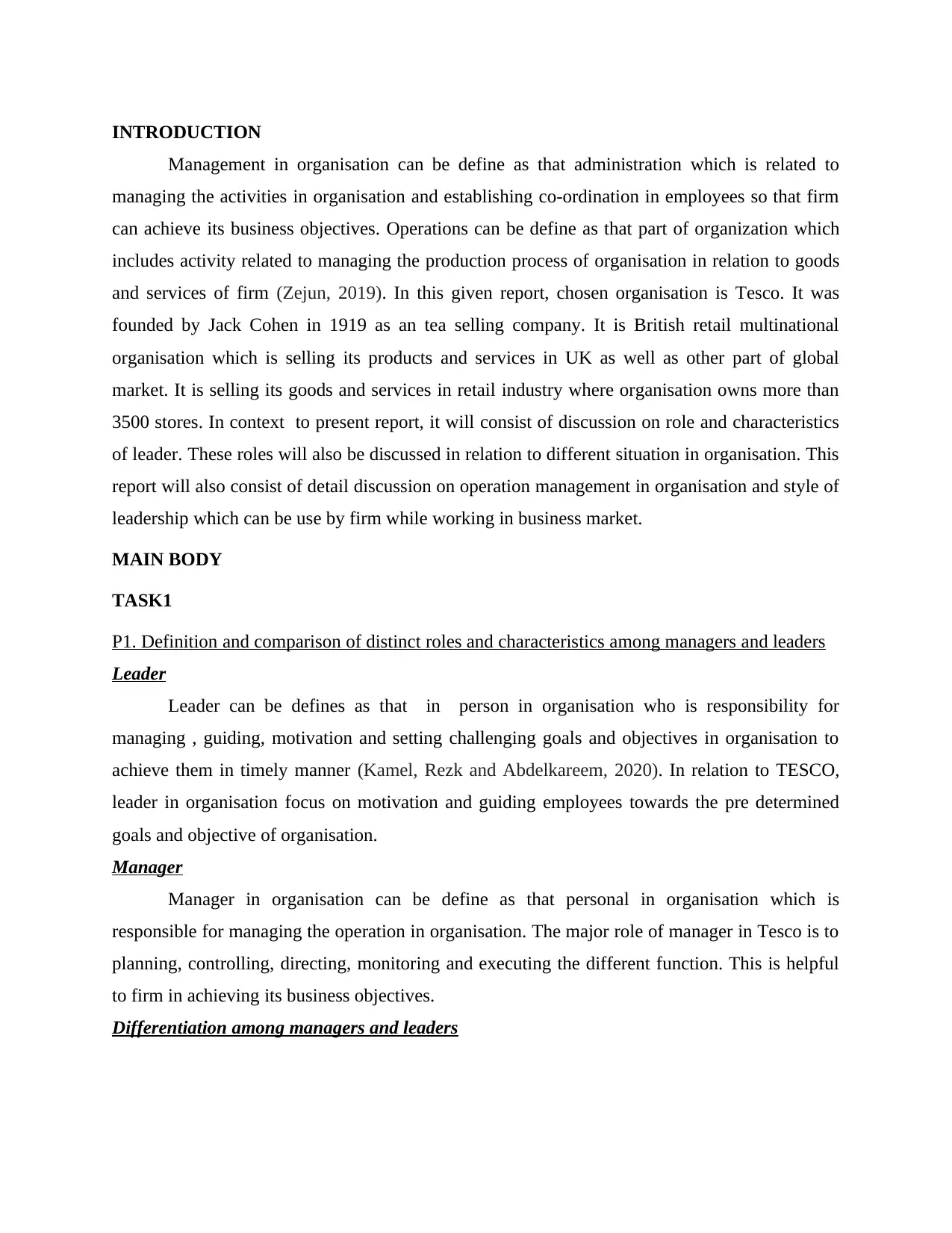
INTRODUCTION
Management in organisation can be define as that administration which is related to
managing the activities in organisation and establishing co-ordination in employees so that firm
can achieve its business objectives. Operations can be define as that part of organization which
includes activity related to managing the production process of organisation in relation to goods
and services of firm (Zejun, 2019). In this given report, chosen organisation is Tesco. It was
founded by Jack Cohen in 1919 as an tea selling company. It is British retail multinational
organisation which is selling its products and services in UK as well as other part of global
market. It is selling its goods and services in retail industry where organisation owns more than
3500 stores. In context to present report, it will consist of discussion on role and characteristics
of leader. These roles will also be discussed in relation to different situation in organisation. This
report will also consist of detail discussion on operation management in organisation and style of
leadership which can be use by firm while working in business market.
MAIN BODY
TASK1
P1. Definition and comparison of distinct roles and characteristics among managers and leaders
Leader
Leader can be defines as that in person in organisation who is responsibility for
managing , guiding, motivation and setting challenging goals and objectives in organisation to
achieve them in timely manner (Kamel, Rezk and Abdelkareem, 2020). In relation to TESCO,
leader in organisation focus on motivation and guiding employees towards the pre determined
goals and objective of organisation.
Manager
Manager in organisation can be define as that personal in organisation which is
responsible for managing the operation in organisation. The major role of manager in Tesco is to
planning, controlling, directing, monitoring and executing the different function. This is helpful
to firm in achieving its business objectives.
Differentiation among managers and leaders
Management in organisation can be define as that administration which is related to
managing the activities in organisation and establishing co-ordination in employees so that firm
can achieve its business objectives. Operations can be define as that part of organization which
includes activity related to managing the production process of organisation in relation to goods
and services of firm (Zejun, 2019). In this given report, chosen organisation is Tesco. It was
founded by Jack Cohen in 1919 as an tea selling company. It is British retail multinational
organisation which is selling its products and services in UK as well as other part of global
market. It is selling its goods and services in retail industry where organisation owns more than
3500 stores. In context to present report, it will consist of discussion on role and characteristics
of leader. These roles will also be discussed in relation to different situation in organisation. This
report will also consist of detail discussion on operation management in organisation and style of
leadership which can be use by firm while working in business market.
MAIN BODY
TASK1
P1. Definition and comparison of distinct roles and characteristics among managers and leaders
Leader
Leader can be defines as that in person in organisation who is responsibility for
managing , guiding, motivation and setting challenging goals and objectives in organisation to
achieve them in timely manner (Kamel, Rezk and Abdelkareem, 2020). In relation to TESCO,
leader in organisation focus on motivation and guiding employees towards the pre determined
goals and objective of organisation.
Manager
Manager in organisation can be define as that personal in organisation which is
responsible for managing the operation in organisation. The major role of manager in Tesco is to
planning, controlling, directing, monitoring and executing the different function. This is helpful
to firm in achieving its business objectives.
Differentiation among managers and leaders
⊘ This is a preview!⊘
Do you want full access?
Subscribe today to unlock all pages.

Trusted by 1+ million students worldwide
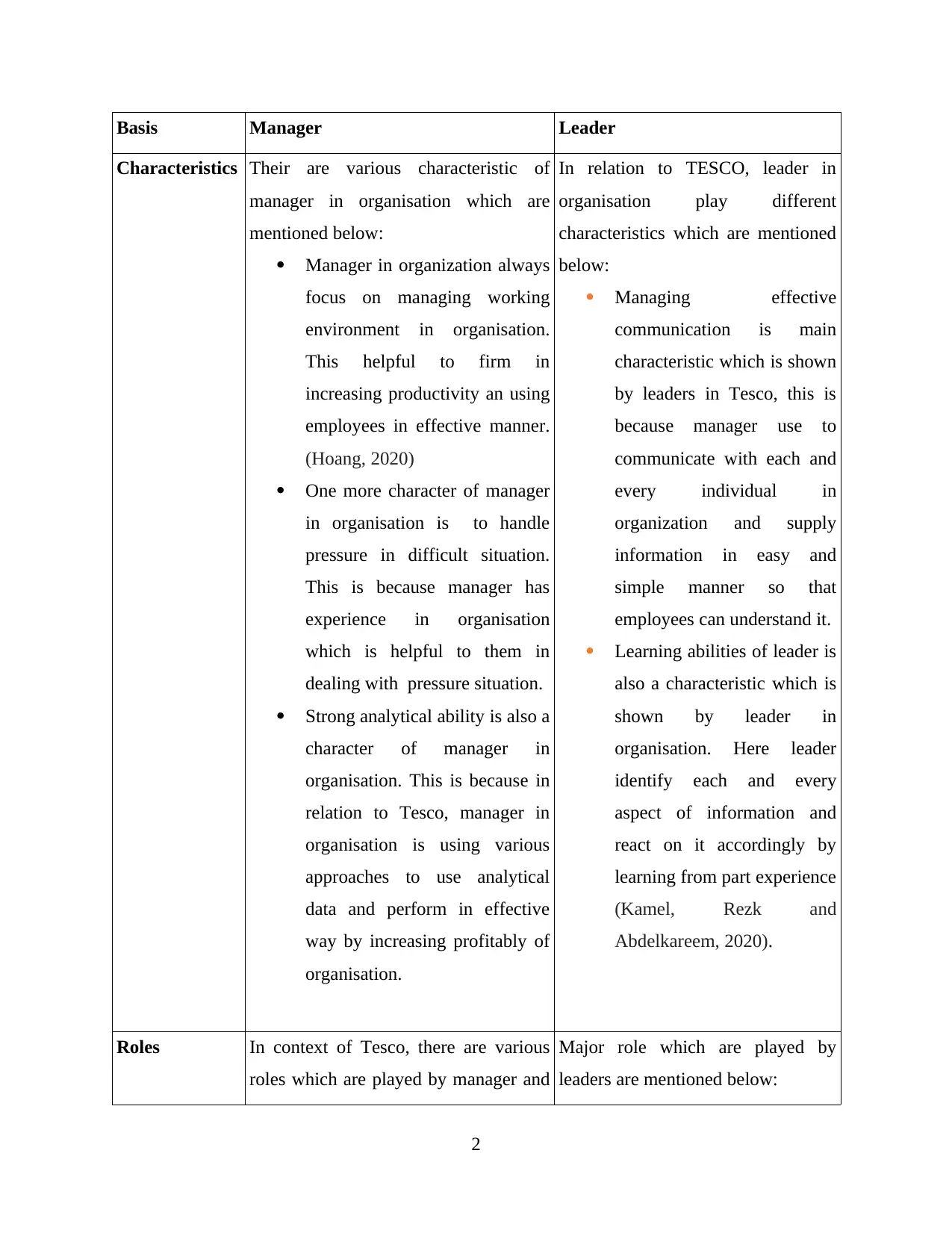
Basis Manager Leader
Characteristics Their are various characteristic of
manager in organisation which are
mentioned below:
Manager in organization always
focus on managing working
environment in organisation.
This helpful to firm in
increasing productivity an using
employees in effective manner.
(Hoang, 2020)
One more character of manager
in organisation is to handle
pressure in difficult situation.
This is because manager has
experience in organisation
which is helpful to them in
dealing with pressure situation.
Strong analytical ability is also a
character of manager in
organisation. This is because in
relation to Tesco, manager in
organisation is using various
approaches to use analytical
data and perform in effective
way by increasing profitably of
organisation.
In relation to TESCO, leader in
organisation play different
characteristics which are mentioned
below:
Managing effective
communication is main
characteristic which is shown
by leaders in Tesco, this is
because manager use to
communicate with each and
every individual in
organization and supply
information in easy and
simple manner so that
employees can understand it.
Learning abilities of leader is
also a characteristic which is
shown by leader in
organisation. Here leader
identify each and every
aspect of information and
react on it accordingly by
learning from part experience
(Kamel, Rezk and
Abdelkareem, 2020).
Roles In context of Tesco, there are various
roles which are played by manager and
Major role which are played by
leaders are mentioned below:
2
Characteristics Their are various characteristic of
manager in organisation which are
mentioned below:
Manager in organization always
focus on managing working
environment in organisation.
This helpful to firm in
increasing productivity an using
employees in effective manner.
(Hoang, 2020)
One more character of manager
in organisation is to handle
pressure in difficult situation.
This is because manager has
experience in organisation
which is helpful to them in
dealing with pressure situation.
Strong analytical ability is also a
character of manager in
organisation. This is because in
relation to Tesco, manager in
organisation is using various
approaches to use analytical
data and perform in effective
way by increasing profitably of
organisation.
In relation to TESCO, leader in
organisation play different
characteristics which are mentioned
below:
Managing effective
communication is main
characteristic which is shown
by leaders in Tesco, this is
because manager use to
communicate with each and
every individual in
organization and supply
information in easy and
simple manner so that
employees can understand it.
Learning abilities of leader is
also a characteristic which is
shown by leader in
organisation. Here leader
identify each and every
aspect of information and
react on it accordingly by
learning from part experience
(Kamel, Rezk and
Abdelkareem, 2020).
Roles In context of Tesco, there are various
roles which are played by manager and
Major role which are played by
leaders are mentioned below:
2
Paraphrase This Document
Need a fresh take? Get an instant paraphrase of this document with our AI Paraphraser
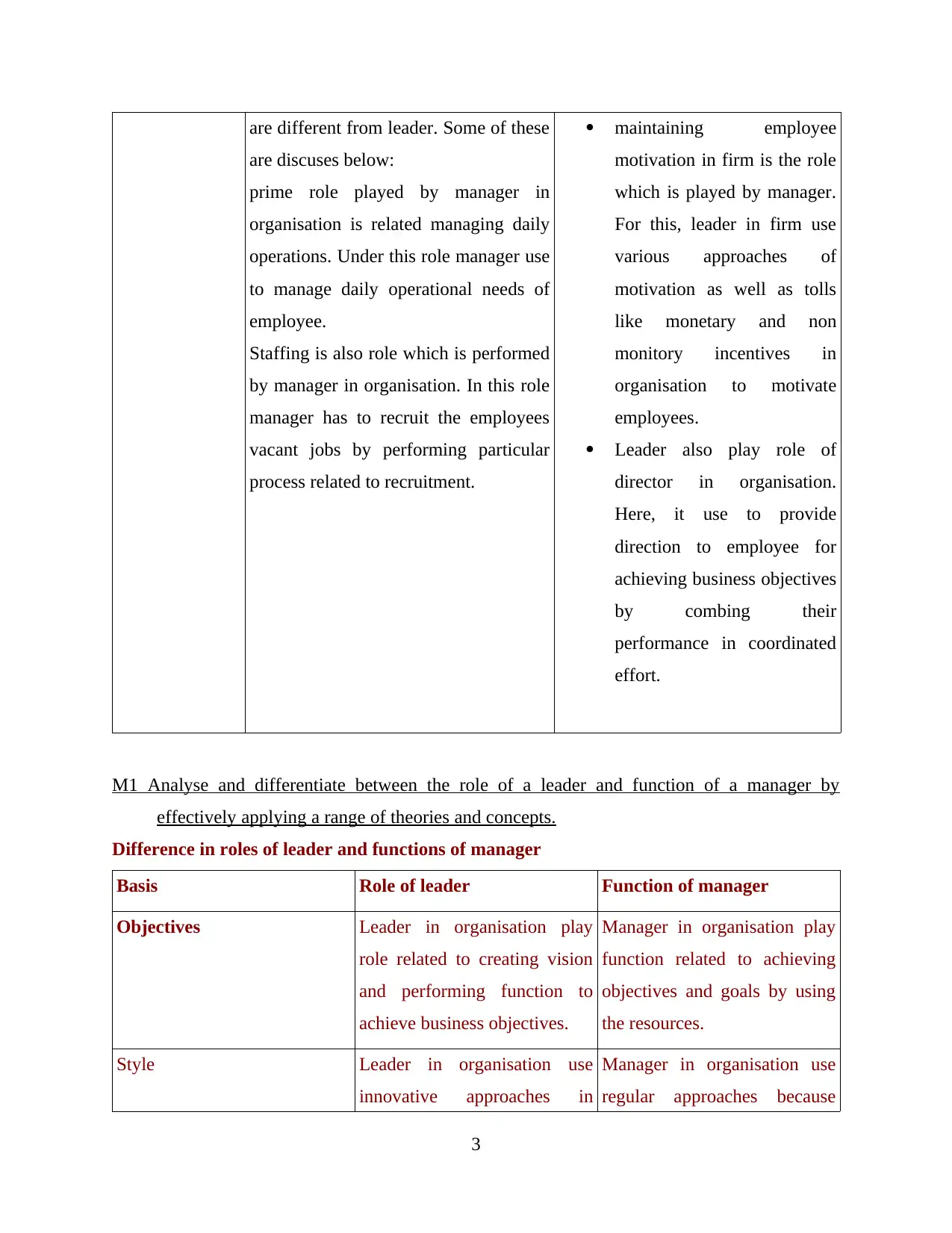
are different from leader. Some of these
are discuses below:
prime role played by manager in
organisation is related managing daily
operations. Under this role manager use
to manage daily operational needs of
employee.
Staffing is also role which is performed
by manager in organisation. In this role
manager has to recruit the employees
vacant jobs by performing particular
process related to recruitment.
maintaining employee
motivation in firm is the role
which is played by manager.
For this, leader in firm use
various approaches of
motivation as well as tolls
like monetary and non
monitory incentives in
organisation to motivate
employees.
Leader also play role of
director in organisation.
Here, it use to provide
direction to employee for
achieving business objectives
by combing their
performance in coordinated
effort.
M1 Analyse and differentiate between the role of a leader and function of a manager by
effectively applying a range of theories and concepts.
Difference in roles of leader and functions of manager
Basis Role of leader Function of manager
Objectives Leader in organisation play
role related to creating vision
and performing function to
achieve business objectives.
Manager in organisation play
function related to achieving
objectives and goals by using
the resources.
Style Leader in organisation use
innovative approaches in
Manager in organisation use
regular approaches because
3
are discuses below:
prime role played by manager in
organisation is related managing daily
operations. Under this role manager use
to manage daily operational needs of
employee.
Staffing is also role which is performed
by manager in organisation. In this role
manager has to recruit the employees
vacant jobs by performing particular
process related to recruitment.
maintaining employee
motivation in firm is the role
which is played by manager.
For this, leader in firm use
various approaches of
motivation as well as tolls
like monetary and non
monitory incentives in
organisation to motivate
employees.
Leader also play role of
director in organisation.
Here, it use to provide
direction to employee for
achieving business objectives
by combing their
performance in coordinated
effort.
M1 Analyse and differentiate between the role of a leader and function of a manager by
effectively applying a range of theories and concepts.
Difference in roles of leader and functions of manager
Basis Role of leader Function of manager
Objectives Leader in organisation play
role related to creating vision
and performing function to
achieve business objectives.
Manager in organisation play
function related to achieving
objectives and goals by using
the resources.
Style Leader in organisation use
innovative approaches in
Manager in organisation use
regular approaches because
3
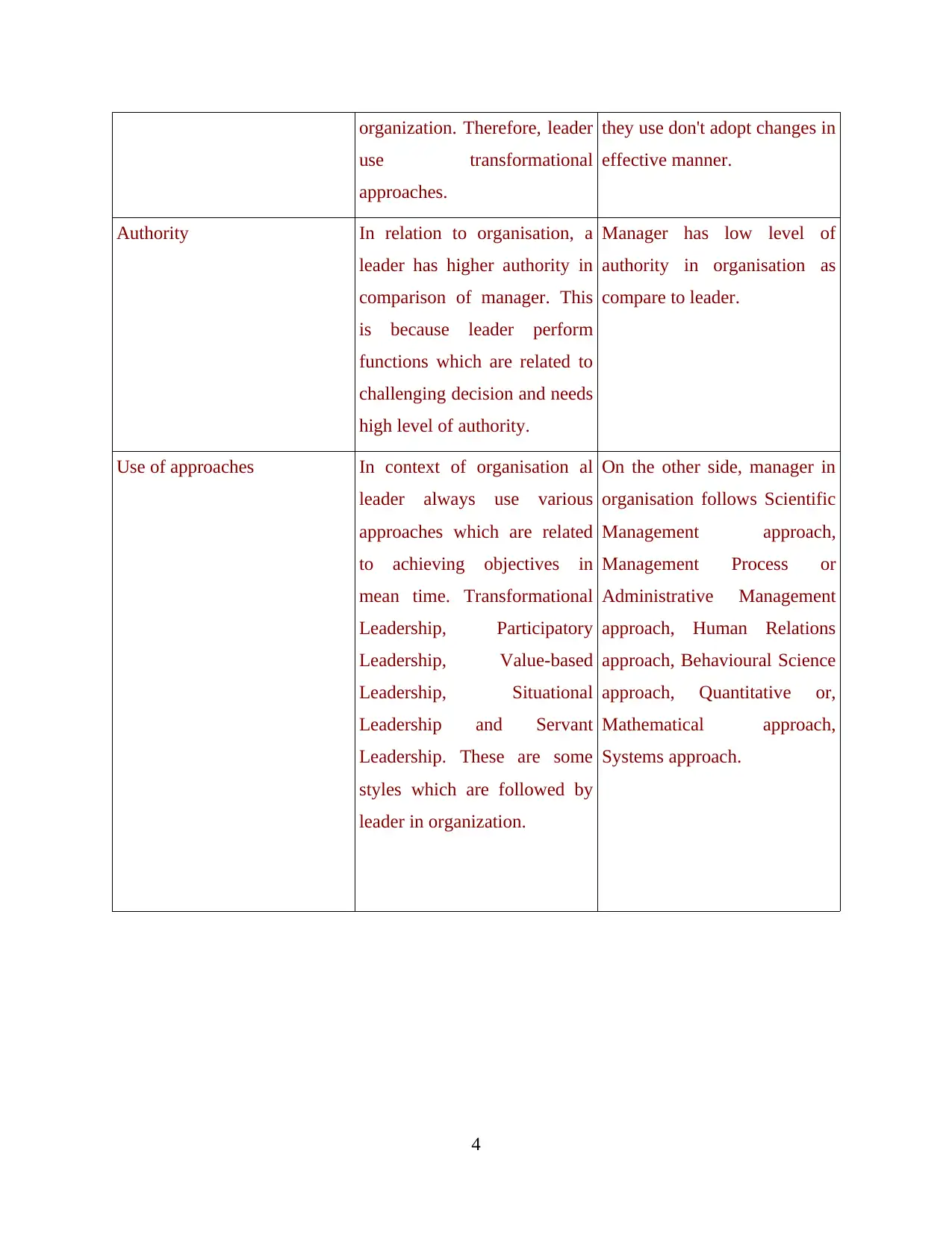
organization. Therefore, leader
use transformational
approaches.
they use don't adopt changes in
effective manner.
Authority In relation to organisation, a
leader has higher authority in
comparison of manager. This
is because leader perform
functions which are related to
challenging decision and needs
high level of authority.
Manager has low level of
authority in organisation as
compare to leader.
Use of approaches In context of organisation al
leader always use various
approaches which are related
to achieving objectives in
mean time. Transformational
Leadership, Participatory
Leadership, Value-based
Leadership, Situational
Leadership and Servant
Leadership. These are some
styles which are followed by
leader in organization.
On the other side, manager in
organisation follows Scientific
Management approach,
Management Process or
Administrative Management
approach, Human Relations
approach, Behavioural Science
approach, Quantitative or,
Mathematical approach,
Systems approach.
4
use transformational
approaches.
they use don't adopt changes in
effective manner.
Authority In relation to organisation, a
leader has higher authority in
comparison of manager. This
is because leader perform
functions which are related to
challenging decision and needs
high level of authority.
Manager has low level of
authority in organisation as
compare to leader.
Use of approaches In context of organisation al
leader always use various
approaches which are related
to achieving objectives in
mean time. Transformational
Leadership, Participatory
Leadership, Value-based
Leadership, Situational
Leadership and Servant
Leadership. These are some
styles which are followed by
leader in organization.
On the other side, manager in
organisation follows Scientific
Management approach,
Management Process or
Administrative Management
approach, Human Relations
approach, Behavioural Science
approach, Quantitative or,
Mathematical approach,
Systems approach.
4
⊘ This is a preview!⊘
Do you want full access?
Subscribe today to unlock all pages.

Trusted by 1+ million students worldwide
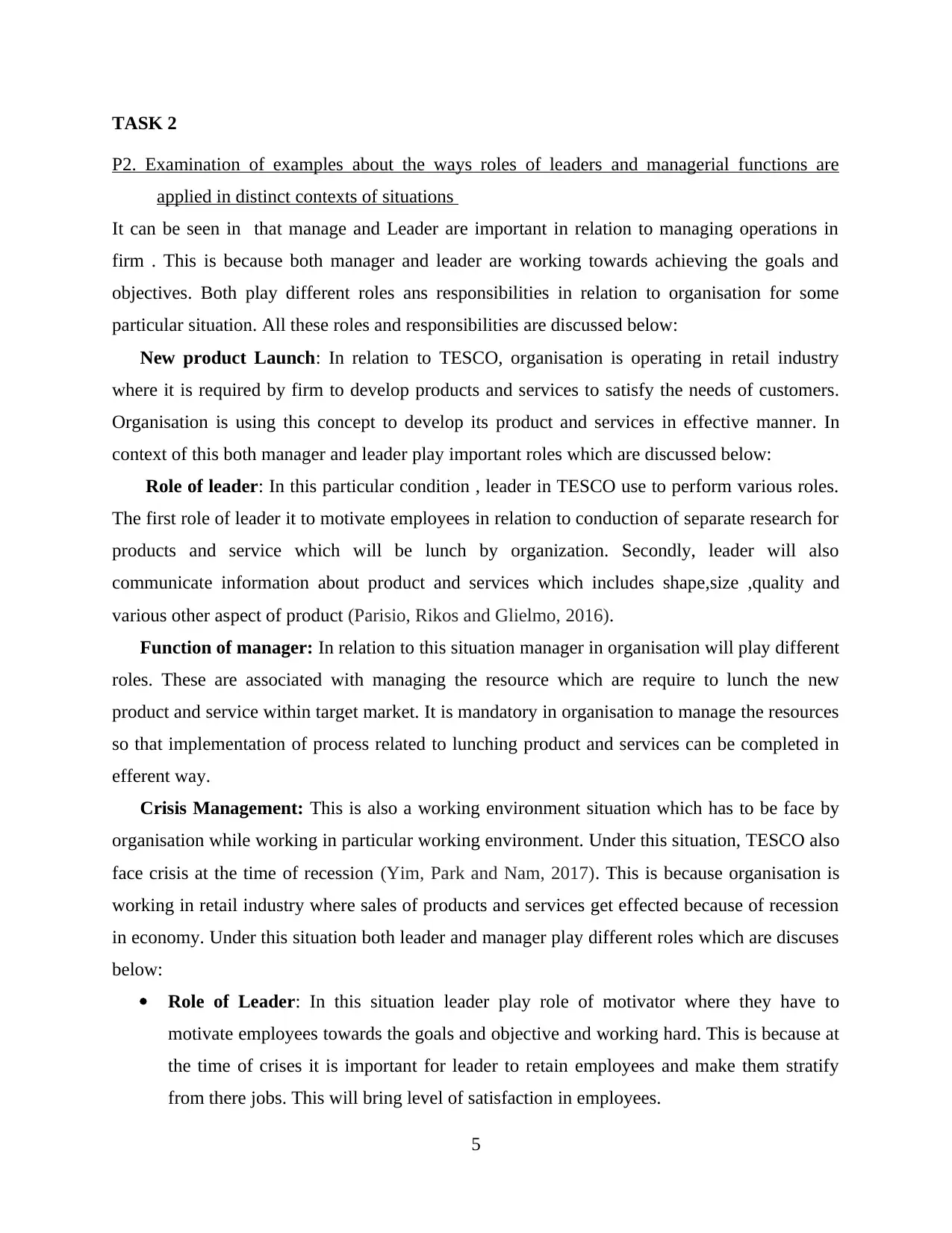
TASK 2
P2. Examination of examples about the ways roles of leaders and managerial functions are
applied in distinct contexts of situations
It can be seen in that manage and Leader are important in relation to managing operations in
firm . This is because both manager and leader are working towards achieving the goals and
objectives. Both play different roles ans responsibilities in relation to organisation for some
particular situation. All these roles and responsibilities are discussed below:
New product Launch: In relation to TESCO, organisation is operating in retail industry
where it is required by firm to develop products and services to satisfy the needs of customers.
Organisation is using this concept to develop its product and services in effective manner. In
context of this both manager and leader play important roles which are discussed below:
Role of leader: In this particular condition , leader in TESCO use to perform various roles.
The first role of leader it to motivate employees in relation to conduction of separate research for
products and service which will be lunch by organization. Secondly, leader will also
communicate information about product and services which includes shape,size ,quality and
various other aspect of product (Parisio, Rikos and Glielmo, 2016).
Function of manager: In relation to this situation manager in organisation will play different
roles. These are associated with managing the resource which are require to lunch the new
product and service within target market. It is mandatory in organisation to manage the resources
so that implementation of process related to lunching product and services can be completed in
efferent way.
Crisis Management: This is also a working environment situation which has to be face by
organisation while working in particular working environment. Under this situation, TESCO also
face crisis at the time of recession (Yim, Park and Nam, 2017). This is because organisation is
working in retail industry where sales of products and services get effected because of recession
in economy. Under this situation both leader and manager play different roles which are discuses
below:
Role of Leader: In this situation leader play role of motivator where they have to
motivate employees towards the goals and objective and working hard. This is because at
the time of crises it is important for leader to retain employees and make them stratify
from there jobs. This will bring level of satisfaction in employees.
5
P2. Examination of examples about the ways roles of leaders and managerial functions are
applied in distinct contexts of situations
It can be seen in that manage and Leader are important in relation to managing operations in
firm . This is because both manager and leader are working towards achieving the goals and
objectives. Both play different roles ans responsibilities in relation to organisation for some
particular situation. All these roles and responsibilities are discussed below:
New product Launch: In relation to TESCO, organisation is operating in retail industry
where it is required by firm to develop products and services to satisfy the needs of customers.
Organisation is using this concept to develop its product and services in effective manner. In
context of this both manager and leader play important roles which are discussed below:
Role of leader: In this particular condition , leader in TESCO use to perform various roles.
The first role of leader it to motivate employees in relation to conduction of separate research for
products and service which will be lunch by organization. Secondly, leader will also
communicate information about product and services which includes shape,size ,quality and
various other aspect of product (Parisio, Rikos and Glielmo, 2016).
Function of manager: In relation to this situation manager in organisation will play different
roles. These are associated with managing the resource which are require to lunch the new
product and service within target market. It is mandatory in organisation to manage the resources
so that implementation of process related to lunching product and services can be completed in
efferent way.
Crisis Management: This is also a working environment situation which has to be face by
organisation while working in particular working environment. Under this situation, TESCO also
face crisis at the time of recession (Yim, Park and Nam, 2017). This is because organisation is
working in retail industry where sales of products and services get effected because of recession
in economy. Under this situation both leader and manager play different roles which are discuses
below:
Role of Leader: In this situation leader play role of motivator where they have to
motivate employees towards the goals and objective and working hard. This is because at
the time of crises it is important for leader to retain employees and make them stratify
from there jobs. This will bring level of satisfaction in employees.
5
Paraphrase This Document
Need a fresh take? Get an instant paraphrase of this document with our AI Paraphraser
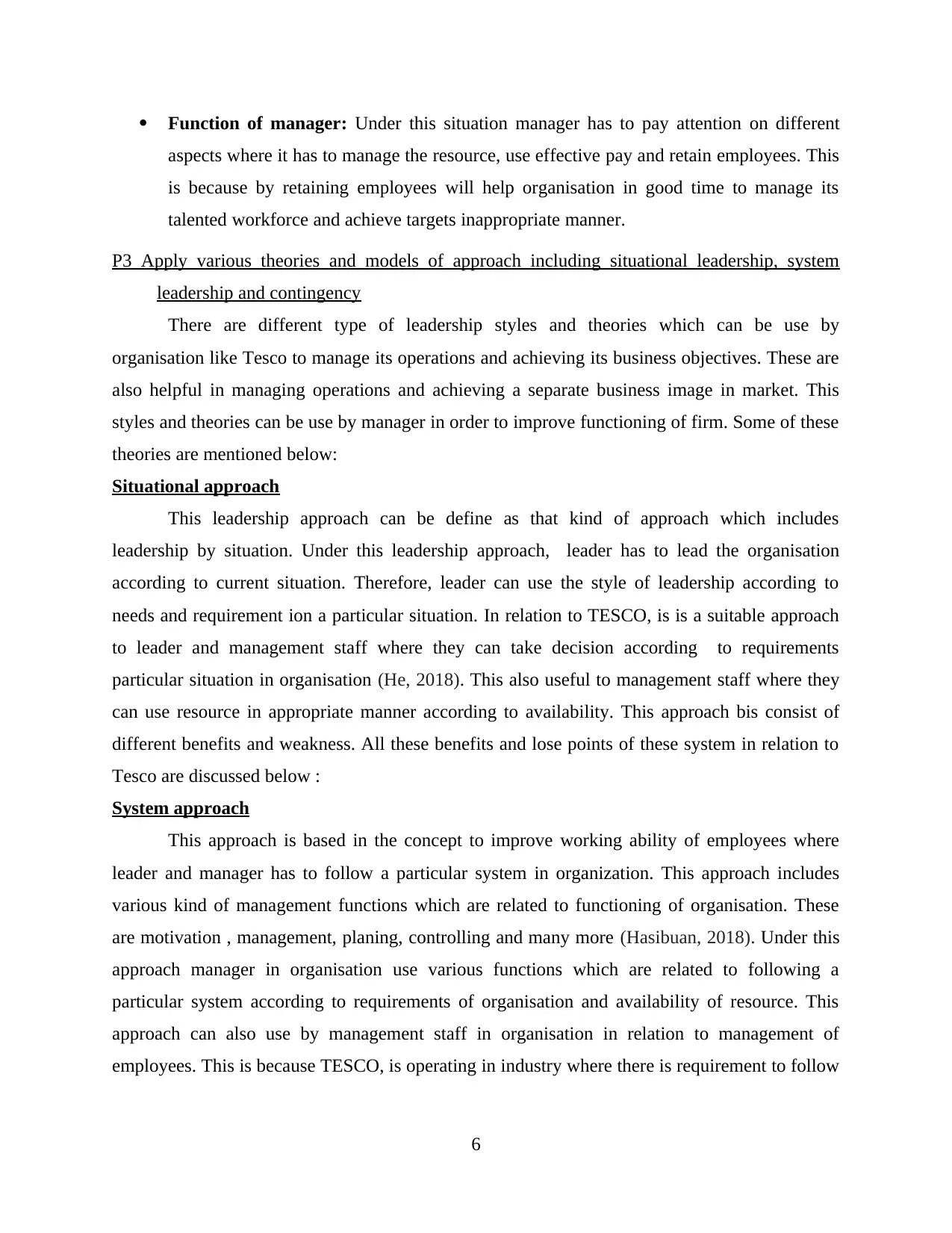
Function of manager: Under this situation manager has to pay attention on different
aspects where it has to manage the resource, use effective pay and retain employees. This
is because by retaining employees will help organisation in good time to manage its
talented workforce and achieve targets inappropriate manner.
P3 Apply various theories and models of approach including situational leadership, system
leadership and contingency
There are different type of leadership styles and theories which can be use by
organisation like Tesco to manage its operations and achieving its business objectives. These are
also helpful in managing operations and achieving a separate business image in market. This
styles and theories can be use by manager in order to improve functioning of firm. Some of these
theories are mentioned below:
Situational approach
This leadership approach can be define as that kind of approach which includes
leadership by situation. Under this leadership approach, leader has to lead the organisation
according to current situation. Therefore, leader can use the style of leadership according to
needs and requirement ion a particular situation. In relation to TESCO, is is a suitable approach
to leader and management staff where they can take decision according to requirements
particular situation in organisation (He, 2018). This also useful to management staff where they
can use resource in appropriate manner according to availability. This approach bis consist of
different benefits and weakness. All these benefits and lose points of these system in relation to
Tesco are discussed below :
System approach
This approach is based in the concept to improve working ability of employees where
leader and manager has to follow a particular system in organization. This approach includes
various kind of management functions which are related to functioning of organisation. These
are motivation , management, planing, controlling and many more (Hasibuan, 2018). Under this
approach manager in organisation use various functions which are related to following a
particular system according to requirements of organisation and availability of resource. This
approach can also use by management staff in organisation in relation to management of
employees. This is because TESCO, is operating in industry where there is requirement to follow
6
aspects where it has to manage the resource, use effective pay and retain employees. This
is because by retaining employees will help organisation in good time to manage its
talented workforce and achieve targets inappropriate manner.
P3 Apply various theories and models of approach including situational leadership, system
leadership and contingency
There are different type of leadership styles and theories which can be use by
organisation like Tesco to manage its operations and achieving its business objectives. These are
also helpful in managing operations and achieving a separate business image in market. This
styles and theories can be use by manager in order to improve functioning of firm. Some of these
theories are mentioned below:
Situational approach
This leadership approach can be define as that kind of approach which includes
leadership by situation. Under this leadership approach, leader has to lead the organisation
according to current situation. Therefore, leader can use the style of leadership according to
needs and requirement ion a particular situation. In relation to TESCO, is is a suitable approach
to leader and management staff where they can take decision according to requirements
particular situation in organisation (He, 2018). This also useful to management staff where they
can use resource in appropriate manner according to availability. This approach bis consist of
different benefits and weakness. All these benefits and lose points of these system in relation to
Tesco are discussed below :
System approach
This approach is based in the concept to improve working ability of employees where
leader and manager has to follow a particular system in organization. This approach includes
various kind of management functions which are related to functioning of organisation. These
are motivation , management, planing, controlling and many more (Hasibuan, 2018). Under this
approach manager in organisation use various functions which are related to following a
particular system according to requirements of organisation and availability of resource. This
approach can also use by management staff in organisation in relation to management of
employees. This is because TESCO, is operating in industry where there is requirement to follow
6
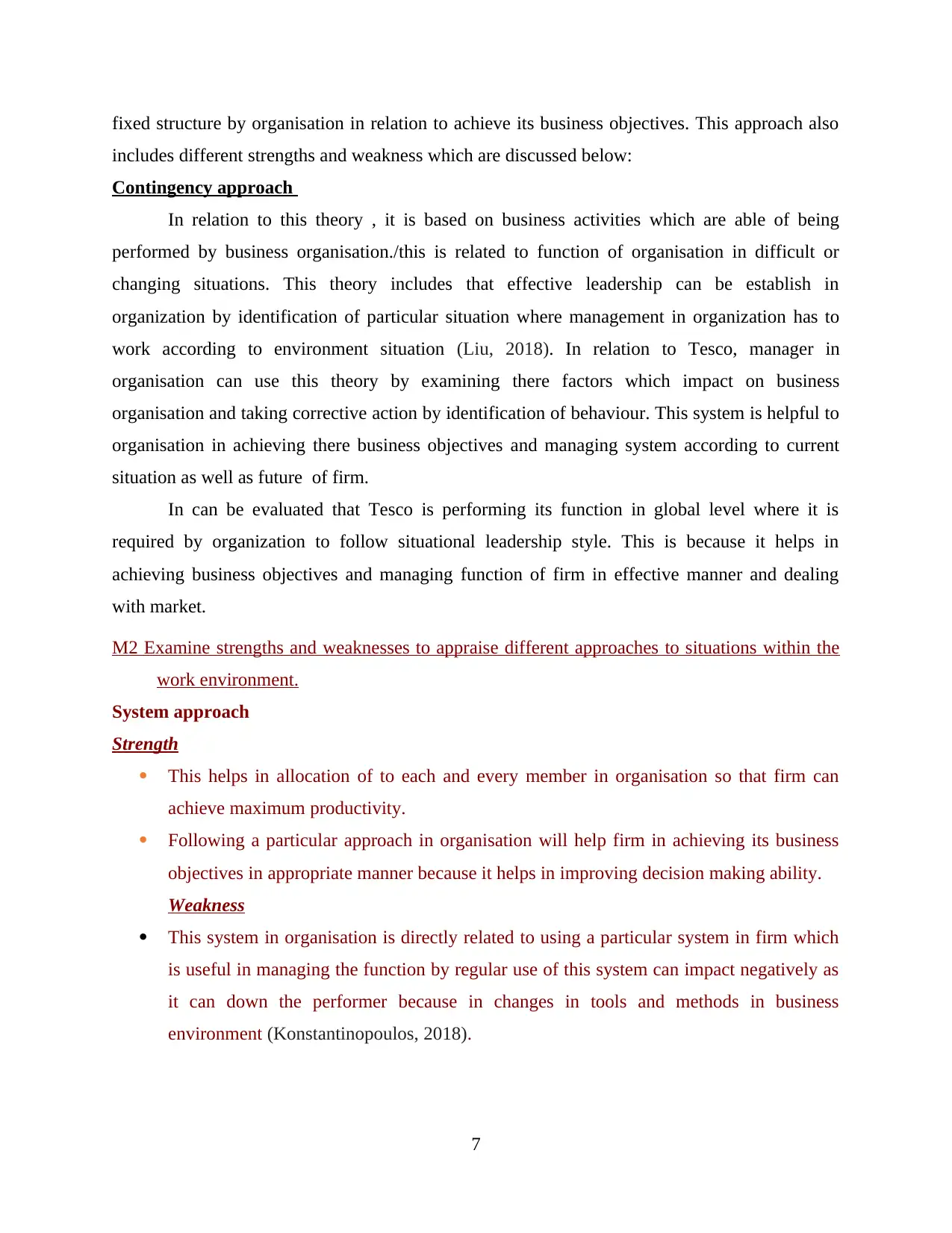
fixed structure by organisation in relation to achieve its business objectives. This approach also
includes different strengths and weakness which are discussed below:
Contingency approach
In relation to this theory , it is based on business activities which are able of being
performed by business organisation./this is related to function of organisation in difficult or
changing situations. This theory includes that effective leadership can be establish in
organization by identification of particular situation where management in organization has to
work according to environment situation (Liu, 2018). In relation to Tesco, manager in
organisation can use this theory by examining there factors which impact on business
organisation and taking corrective action by identification of behaviour. This system is helpful to
organisation in achieving there business objectives and managing system according to current
situation as well as future of firm.
In can be evaluated that Tesco is performing its function in global level where it is
required by organization to follow situational leadership style. This is because it helps in
achieving business objectives and managing function of firm in effective manner and dealing
with market.
M2 Examine strengths and weaknesses to appraise different approaches to situations within the
work environment.
System approach
Strength
This helps in allocation of to each and every member in organisation so that firm can
achieve maximum productivity.
Following a particular approach in organisation will help firm in achieving its business
objectives in appropriate manner because it helps in improving decision making ability.
Weakness
This system in organisation is directly related to using a particular system in firm which
is useful in managing the function by regular use of this system can impact negatively as
it can down the performer because in changes in tools and methods in business
environment (Konstantinopoulos, 2018).
7
includes different strengths and weakness which are discussed below:
Contingency approach
In relation to this theory , it is based on business activities which are able of being
performed by business organisation./this is related to function of organisation in difficult or
changing situations. This theory includes that effective leadership can be establish in
organization by identification of particular situation where management in organization has to
work according to environment situation (Liu, 2018). In relation to Tesco, manager in
organisation can use this theory by examining there factors which impact on business
organisation and taking corrective action by identification of behaviour. This system is helpful to
organisation in achieving there business objectives and managing system according to current
situation as well as future of firm.
In can be evaluated that Tesco is performing its function in global level where it is
required by organization to follow situational leadership style. This is because it helps in
achieving business objectives and managing function of firm in effective manner and dealing
with market.
M2 Examine strengths and weaknesses to appraise different approaches to situations within the
work environment.
System approach
Strength
This helps in allocation of to each and every member in organisation so that firm can
achieve maximum productivity.
Following a particular approach in organisation will help firm in achieving its business
objectives in appropriate manner because it helps in improving decision making ability.
Weakness
This system in organisation is directly related to using a particular system in firm which
is useful in managing the function by regular use of this system can impact negatively as
it can down the performer because in changes in tools and methods in business
environment (Konstantinopoulos, 2018).
7
⊘ This is a preview!⊘
Do you want full access?
Subscribe today to unlock all pages.

Trusted by 1+ million students worldwide
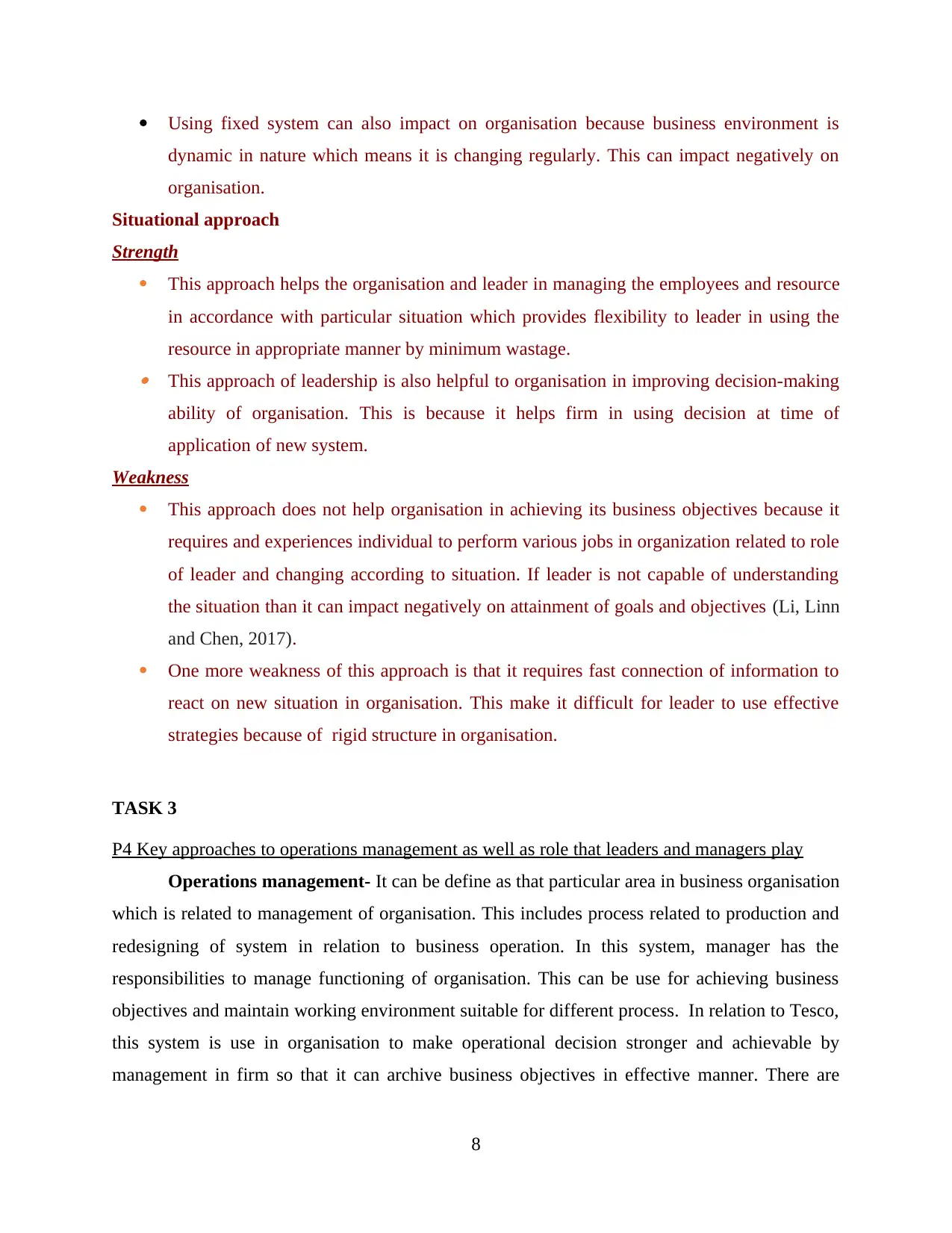
Using fixed system can also impact on organisation because business environment is
dynamic in nature which means it is changing regularly. This can impact negatively on
organisation.
Situational approach
Strength
This approach helps the organisation and leader in managing the employees and resource
in accordance with particular situation which provides flexibility to leader in using the
resource in appropriate manner by minimum wastage. This approach of leadership is also helpful to organisation in improving decision-making
ability of organisation. This is because it helps firm in using decision at time of
application of new system.
Weakness
This approach does not help organisation in achieving its business objectives because it
requires and experiences individual to perform various jobs in organization related to role
of leader and changing according to situation. If leader is not capable of understanding
the situation than it can impact negatively on attainment of goals and objectives (Li, Linn
and Chen, 2017).
One more weakness of this approach is that it requires fast connection of information to
react on new situation in organisation. This make it difficult for leader to use effective
strategies because of rigid structure in organisation.
TASK 3
P4 Key approaches to operations management as well as role that leaders and managers play
Operations management- It can be define as that particular area in business organisation
which is related to management of organisation. This includes process related to production and
redesigning of system in relation to business operation. In this system, manager has the
responsibilities to manage functioning of organisation. This can be use for achieving business
objectives and maintain working environment suitable for different process. In relation to Tesco,
this system is use in organisation to make operational decision stronger and achievable by
management in firm so that it can archive business objectives in effective manner. There are
8
dynamic in nature which means it is changing regularly. This can impact negatively on
organisation.
Situational approach
Strength
This approach helps the organisation and leader in managing the employees and resource
in accordance with particular situation which provides flexibility to leader in using the
resource in appropriate manner by minimum wastage. This approach of leadership is also helpful to organisation in improving decision-making
ability of organisation. This is because it helps firm in using decision at time of
application of new system.
Weakness
This approach does not help organisation in achieving its business objectives because it
requires and experiences individual to perform various jobs in organization related to role
of leader and changing according to situation. If leader is not capable of understanding
the situation than it can impact negatively on attainment of goals and objectives (Li, Linn
and Chen, 2017).
One more weakness of this approach is that it requires fast connection of information to
react on new situation in organisation. This make it difficult for leader to use effective
strategies because of rigid structure in organisation.
TASK 3
P4 Key approaches to operations management as well as role that leaders and managers play
Operations management- It can be define as that particular area in business organisation
which is related to management of organisation. This includes process related to production and
redesigning of system in relation to business operation. In this system, manager has the
responsibilities to manage functioning of organisation. This can be use for achieving business
objectives and maintain working environment suitable for different process. In relation to Tesco,
this system is use in organisation to make operational decision stronger and achievable by
management in firm so that it can archive business objectives in effective manner. There are
8
Paraphrase This Document
Need a fresh take? Get an instant paraphrase of this document with our AI Paraphraser
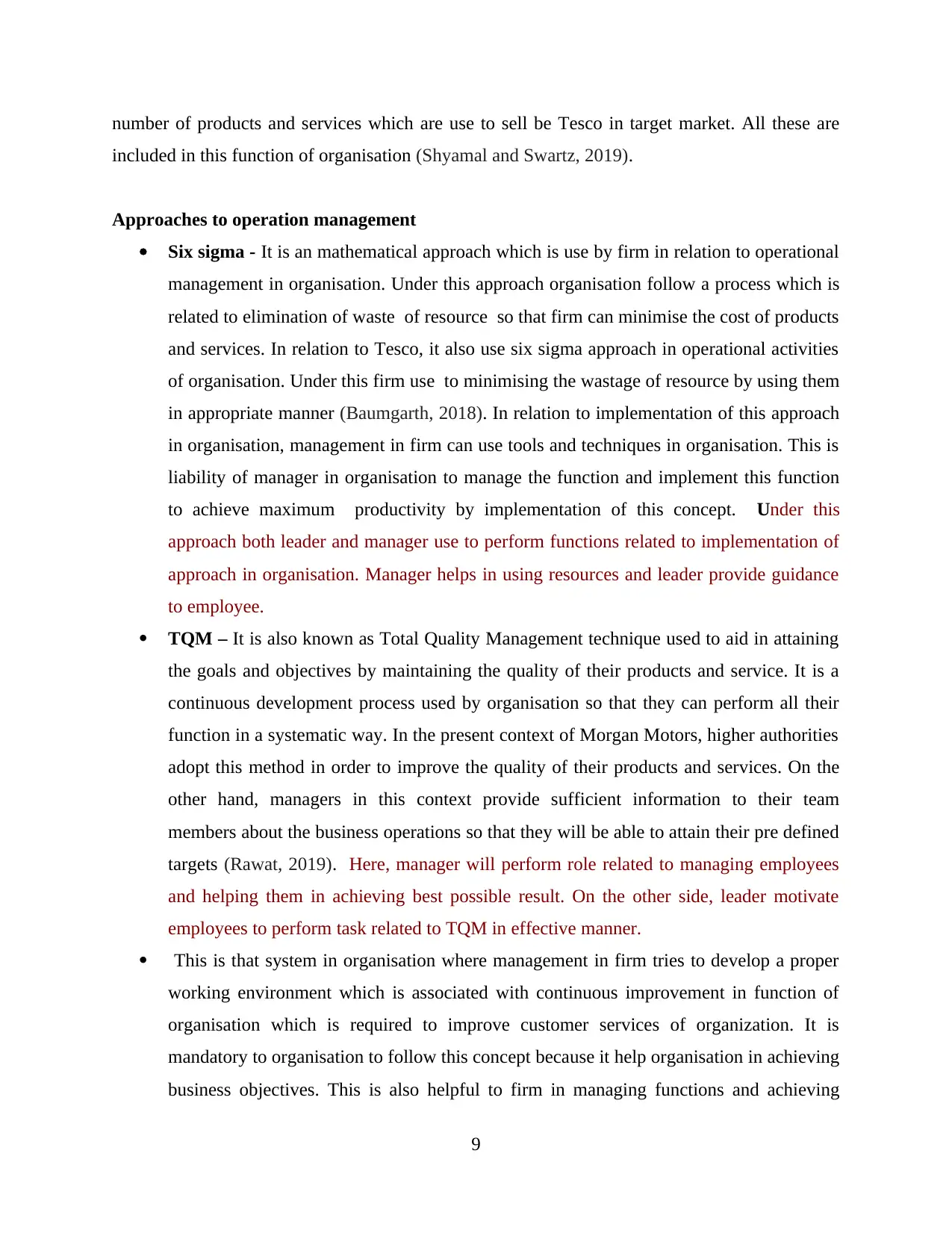
number of products and services which are use to sell be Tesco in target market. All these are
included in this function of organisation (Shyamal and Swartz, 2019).
Approaches to operation management
Six sigma - It is an mathematical approach which is use by firm in relation to operational
management in organisation. Under this approach organisation follow a process which is
related to elimination of waste of resource so that firm can minimise the cost of products
and services. In relation to Tesco, it also use six sigma approach in operational activities
of organisation. Under this firm use to minimising the wastage of resource by using them
in appropriate manner (Baumgarth, 2018). In relation to implementation of this approach
in organisation, management in firm can use tools and techniques in organisation. This is
liability of manager in organisation to manage the function and implement this function
to achieve maximum productivity by implementation of this concept. Under this
approach both leader and manager use to perform functions related to implementation of
approach in organisation. Manager helps in using resources and leader provide guidance
to employee.
TQM – It is also known as Total Quality Management technique used to aid in attaining
the goals and objectives by maintaining the quality of their products and service. It is a
continuous development process used by organisation so that they can perform all their
function in a systematic way. In the present context of Morgan Motors, higher authorities
adopt this method in order to improve the quality of their products and services. On the
other hand, managers in this context provide sufficient information to their team
members about the business operations so that they will be able to attain their pre defined
targets (Rawat, 2019). Here, manager will perform role related to managing employees
and helping them in achieving best possible result. On the other side, leader motivate
employees to perform task related to TQM in effective manner.
This is that system in organisation where management in firm tries to develop a proper
working environment which is associated with continuous improvement in function of
organisation which is required to improve customer services of organization. It is
mandatory to organisation to follow this concept because it help organisation in achieving
business objectives. This is also helpful to firm in managing functions and achieving
9
included in this function of organisation (Shyamal and Swartz, 2019).
Approaches to operation management
Six sigma - It is an mathematical approach which is use by firm in relation to operational
management in organisation. Under this approach organisation follow a process which is
related to elimination of waste of resource so that firm can minimise the cost of products
and services. In relation to Tesco, it also use six sigma approach in operational activities
of organisation. Under this firm use to minimising the wastage of resource by using them
in appropriate manner (Baumgarth, 2018). In relation to implementation of this approach
in organisation, management in firm can use tools and techniques in organisation. This is
liability of manager in organisation to manage the function and implement this function
to achieve maximum productivity by implementation of this concept. Under this
approach both leader and manager use to perform functions related to implementation of
approach in organisation. Manager helps in using resources and leader provide guidance
to employee.
TQM – It is also known as Total Quality Management technique used to aid in attaining
the goals and objectives by maintaining the quality of their products and service. It is a
continuous development process used by organisation so that they can perform all their
function in a systematic way. In the present context of Morgan Motors, higher authorities
adopt this method in order to improve the quality of their products and services. On the
other hand, managers in this context provide sufficient information to their team
members about the business operations so that they will be able to attain their pre defined
targets (Rawat, 2019). Here, manager will perform role related to managing employees
and helping them in achieving best possible result. On the other side, leader motivate
employees to perform task related to TQM in effective manner.
This is that system in organisation where management in firm tries to develop a proper
working environment which is associated with continuous improvement in function of
organisation which is required to improve customer services of organization. It is
mandatory to organisation to follow this concept because it help organisation in achieving
business objectives. This is also helpful to firm in managing functions and achieving
9
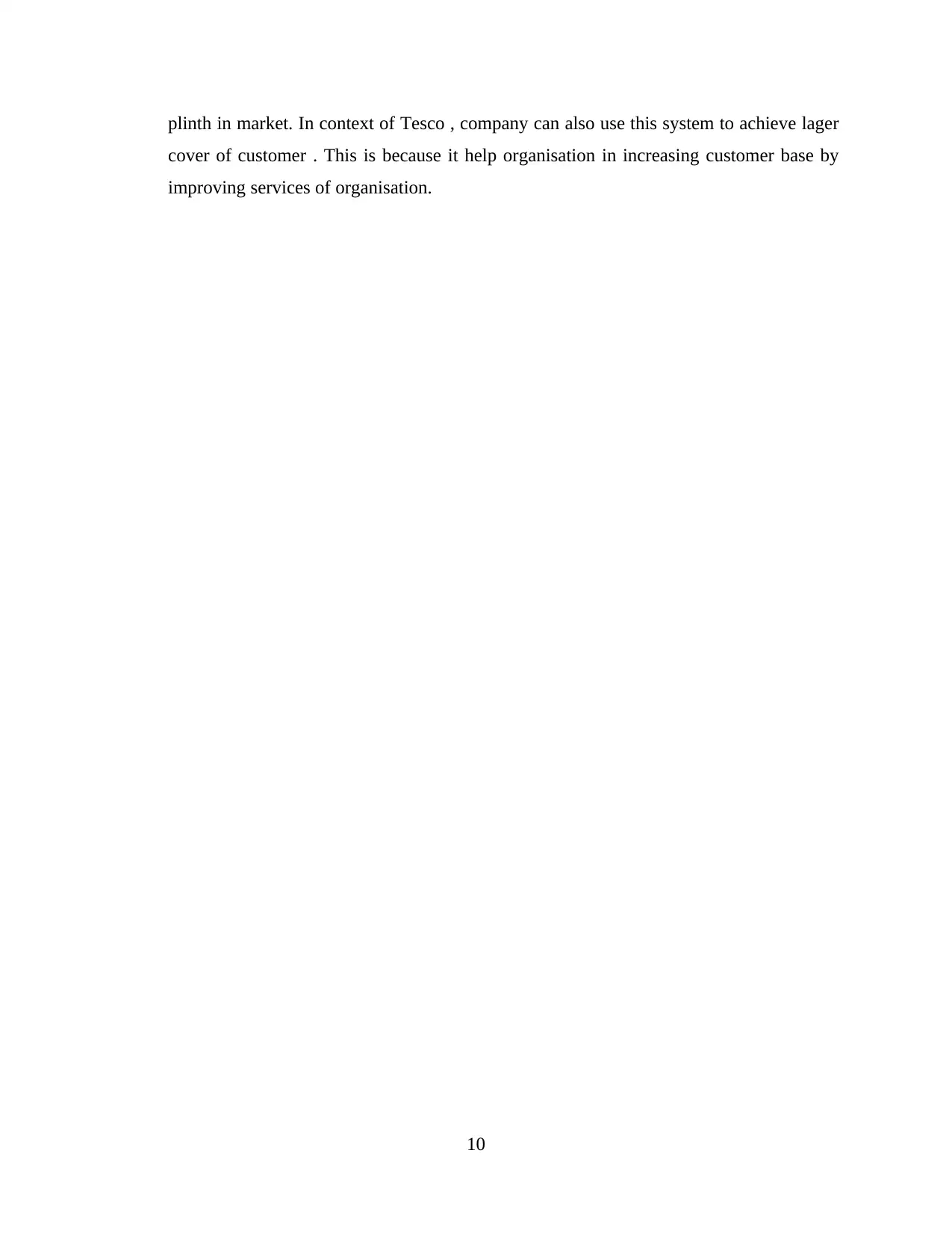
plinth in market. In context of Tesco , company can also use this system to achieve lager
cover of customer . This is because it help organisation in increasing customer base by
improving services of organisation.
10
cover of customer . This is because it help organisation in increasing customer base by
improving services of organisation.
10
⊘ This is a preview!⊘
Do you want full access?
Subscribe today to unlock all pages.

Trusted by 1+ million students worldwide
1 out of 19
Related Documents
Your All-in-One AI-Powered Toolkit for Academic Success.
+13062052269
info@desklib.com
Available 24*7 on WhatsApp / Email
![[object Object]](/_next/static/media/star-bottom.7253800d.svg)
Unlock your academic potential
Copyright © 2020–2026 A2Z Services. All Rights Reserved. Developed and managed by ZUCOL.





